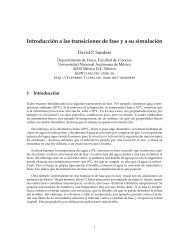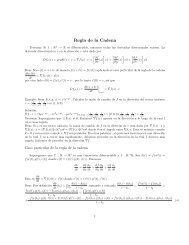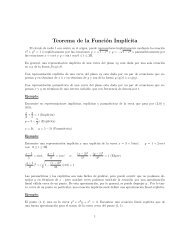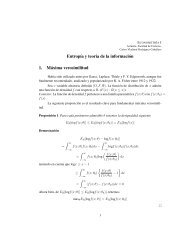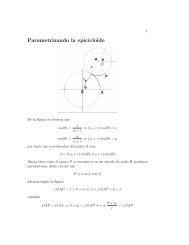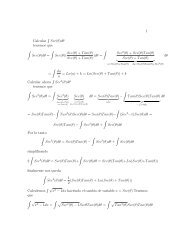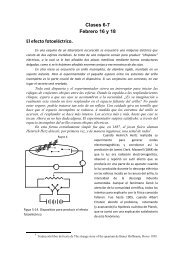"Surely You're Joking, Mr. Feynman!" - unam.
"Surely You're Joking, Mr. Feynman!" - unam.
"Surely You're Joking, Mr. Feynman!" - unam.
Create successful ePaper yourself
Turn your PDF publications into a flip-book with our unique Google optimized e-Paper software.
things so the world will be more like they want it to be: When they're talking about the<br />
behavior of animals, they always start out with, "The paramecium is extremely simple; it<br />
has a simple behavior. It turns as its slipper shape moves through the water until it hits<br />
something, at which time it recoils, turns through an angle, and then starts out again."<br />
It isn't really right. First of all, as everybody knows, the paramecia, from time to<br />
time, conjugate with each other they meet and exchange nuclei. How do they decide<br />
when it's time to do that? (Never mind; that's not my observation.)<br />
I watched these paramecia hit something, recoil, turn through an angle, and go<br />
again. The idea that it's mechanical, like a computer program it doesn't look that way.<br />
They go different distances, they recoil different distances, they turn through angles that<br />
are different in various cases; they don't always turn to the right; they're very irregular. It<br />
looks random, because you don't know what they're hitting; you don't know all the<br />
chemicals they're smelling, or what.<br />
One of the things I wanted to watch was what happens to the paramecium when<br />
the water that it's in dries up. It was claimed that the paramecium can dry up into a sort of<br />
hardened seed. I had a drop of water on the slide under my microscope, and in the drop of<br />
water was a paramecium and some "grass" at the scale of the paramecium, it looked<br />
like a network of jackstraws. As the drop of water evaporated, over a time of fifteen or<br />
twenty minutes, the paramecium got into a tighter and tighter situation: there was more<br />
and more of this backandforth until it could hardly move. It was stuck between these<br />
"sticks," almost jammed.<br />
Then I saw something I had never seen or heard of: the paramecium lost its shape.<br />
It could flex itself, like an amoeba. It began to push itself against one of the sticks, and<br />
began dividing into two prongs until the division was about halfway up the paramecium,<br />
at which time it decided that wasn't a very good idea, and backed away.<br />
So my impression of these animals is that their behavior is much too simplified in<br />
the books. It is not so utterly mechanical or onedimensional as they say. They should<br />
describe the behavior of these simple animals correctly. Until we see how many<br />
dimensions of behavior even a onecelled animal has, we won't be able to fully<br />
understand the behavior of more complicated animals.<br />
I also enjoyed watching bugs. I had an insect book when I was about thirteen. It<br />
said that dragonflies are not harmful; they don't sting. In our neighborhood it was well<br />
known that "darning needles," as we called them, were very dangerous when they'd sting.<br />
So if we were outside somewhere playing baseball, or something, and one of these things<br />
would fly around, everybody would run for cover, waving their arms, yelling, "A darning<br />
needle! A darning needle!"<br />
So one day I was on the beach, and I'd just read this book that said dragonflies<br />
don't sting. A darning needle came along, and everybody was screaming and running<br />
around, and I just sat there. "Don't worry!" I said. "Darning needles don't sting!"<br />
The thing landed on my foot. Everybody was yelling and it was a big mess,<br />
because this darning needle was sitting on my foot. And there I was, this scientific<br />
wonder, saying it wasn't going to sting me.<br />
<strong>You're</strong> sure this is a story that's going to come out that it stings me but it didn't.<br />
The book was right. But I did sweat a bit.<br />
I also had a little hand microscope. It was a toy microscope, and I pulled the<br />
magnification piece out of it, and would hold it in my hand like a magnifying glass, even



